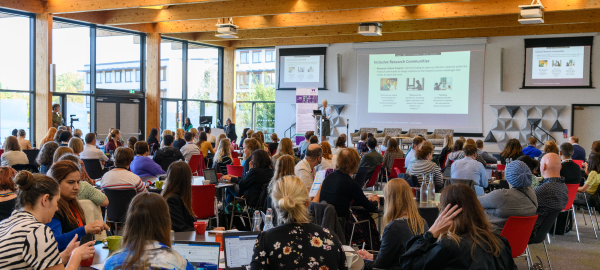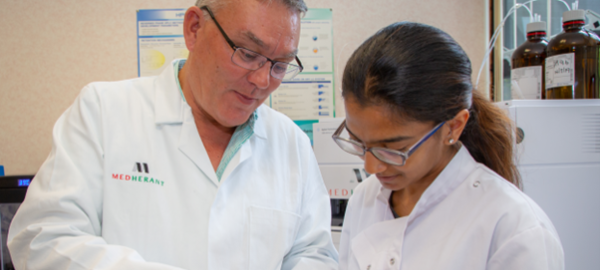Welcome to The University of Warwick’s Research Newsletter, Spotlight.
Spotlight showcases the brilliance of our PhD students, researchers, technicians and academics - the foundation of our research community.
This autumn marks one year of our Spotlight newsletter. Thank you for all of your contributions and I’m so proud of the strides we’ve made in improving our research culture within those 12 months.
This summer, the University launched the first National Centre for Research Culture and last month we held the inaugural International Research Culture Conference, which you can read more about in this edition. Watch the video below to learn more.
Please share widely among your teams and encourage others to sign up to Spotlight. And, if you have something you’d like to contribute to the next edition, please get in touch.
|
Best wishes,

Professor Caroline Meyer, Pro-Vice-Chancellor (Research)
|
International Research Culture Conference 2023

On 25th September, Warwick held its International Research Culture Conference (IRCC), with an in-person and online audience totalling more than 300 delegates.
We welcomed colleagues from across the Higher Education sector for a day of meaningful conversations that sought to build an inclusive community of practice.
The conference included debates around open research, recruitment and career development, research integrity, the role of technicians and researcher wellbeing.
The IRCC is just one of the ways the new National Centre for Research Culture is helping to ensure we improve research culture across the UK.
|
Connecting academics and teachers to deliver change in education

Hear from Dr Kathryn van de Wiel, Research Impact Manager (Social Sciences), on her research culture project which aims to bring researchers and teachers together.
Through the School Impact Network, our researchers have collaborated with schools in the West Midlands, to understand what schools want and need, the challenges they face and how research can provide solutions.
|
What research culture means to Warwick Medical School

WMS’s Kirstie Haywood, Professor of Health Outcomes, is the Strategic Lead for Research Culture within the department. We spoke to her about her work developing a Research Culture Roadmap that enables teams to flourish together.
|
The University of Warwick KEF results 2023

Last month, the Knowledge Excellence Framework (KEF) results were released.
KEF is an annual assessment of how English universities carry out knowledge exchange. It's a key element of Research England’s benchmarking of universities, and assesses universities’ ability to share and translate knowledge into the world outside of academia.
Warwick performed particularly strongly in research partnerships, placing in quintile four which means we displayed high engagement.
The results also placed Warwick in the top 20 per cent for our strong engagement with businesses and the community. Read more about knowledge exchange at Warwick.
|
Welcome Professor Satyajit Mayor, our first Leverhulme International Professor
We’re very pleased to welcome Professor Satyajit Mayor as the Leverhulme International Professor.
Professor Mayor will develop a research programme on cell surface and cellular interfaces thanks to a £5 million grant by the Leverhulme Trust. He will appoint, nurture, and mentor assistant professors, postdoctoral fellows and research assistants to further their research goals.
|
New partnership with Tech West Mids

Did you know that almost 150,000 people work in technical roles in the West Midlands?
As part of our ongoing work with local businesses, Warwick has announced a new partnership with Tech West Mids, a not-for-profit organisation that aims to help tech businesses and entrepreneurs in the region go global.
Earlier this year, we hosted the launch of a new ‘West Midlands Tech Review Report’ on campus.
The report aims to help academia, businesses and industry to work together more effectively in order to further drive the West Midlands’ emerging market in cutting edge technology.
|
 |
Cultivating cultural connections at Coventry Biennial 2023

Following successful partnerships in 2019 and 2021, we’re delighted to be collaborating again as a key sponsor for the Coventry Biennial 2023.
Among the artist and researcher collaborators is Graeme Macdonald, Professor of English and Comparative Literary Studies at The University of Warwick, who’s teamed up with local artist Paul Lemmon as part of a new artist-researcher collaboration.
The exhibition opened at Herbert Art Gallery on 5th October and, on 28th October, they’ll be holding a family arts event “Imagining the Future with Coventry Biennial”.
|
Dr Heidi Ashton on social security and creative workers

Over in the Centre for Media and Policy Studies, Dr Heidi Ashton (pictured, left) has been conducting extensive research on the experiences of freelance workers in the cultural and creative industries.
Her research has revealed that these workers are not fully recognised by policy, falling between the status of employee and self-employed. The research has been discussed in the House of Lords, and has led the Select Committee for Work and Pensions to submit a written question to the Secretary of State.
|
 |
New discoveries in the formation of planets

In the last decade, powerful telescopes have taken images of protoplanetary discs in unprecedented detail.
However, recent observational evidence suggests that planet formation may occur much earlier than previously thought, when the discs are young.
Dr Farzana Meru, from the Department of Physics, is steering an eight-year Research Fellowship project, using state-of-the-art computer simulations to understand how planets form.
The research uses sophisticated computer simulations along with what is already known from observations, to understand the whole planet formation process.
|
Delivering the future of intracellular medicine
Spin-out company, NanoSyrinx (originating from Warwick Medical School) is on a mission to fundamentally revolutionise how medicines are administered, on a nanoscopic scale.
NanoSyrinx is built around technology developed during Dr Joe Healey’s PhD, alongside his co-founder and supervisor Nick Waterfield. The company has raised £7 million in funding to date.
ICURe, a pre-accelerator programme for researchers, helped NanoSyrinx to come together to test their ideas, speak to potential investors, customers, partners and suppliers and understand the problem that needed solving.
|
The first testosterone patch designed for women with menopausal and perimenopausal symptoms

Over in Chemistry, another Warwick spin-out company Medherant, could launch the world’s first testosterone patch for menopause.
Testosterone is an essential hormone for women and its production drops heavily after menopause.
Medherant, started by Professor David Haddleton, will be carrying out a clinical trial of the patch this autumn with women suffering from menopausal and perimenopausal symptoms.
If the patch gets regulatory approval, it will be introduced in the UK, becoming the only testosterone replacement patch available in the world.
|
Warwick researchers helping the UK's post-pandemic recovery
Over the past two years, Warwick's Institute for Employment Research (IER) has played an integral role in the Government advisory group, ReWAGE (Renewing Work Advisory Group of Experts.
|
|
Co-chaired by IER's Professor Chris Warhurst (pictured), along with Professor Irena Grugulis from the University of Leeds, ReWAGE brought together academic experts from across the country, to help the UK’s post-pandemic recovery.
ReWAGE secured over £600k funding, and made significant contributions to UK policy, including producing 40 evidence papers, and contributing to eight parliamentary consultations.
|
|
|
We want to hear from you
Spotlight endeavours to recognise and celebrate research success across The University of Warwick and beyond. Our newsletter relies on contributions from every corner of the research community.
If you have any feedback, or if you'd like to put forward an article for our next edition, please get in touch with the team at researchcomms@warwick.ac.uk.
|
|